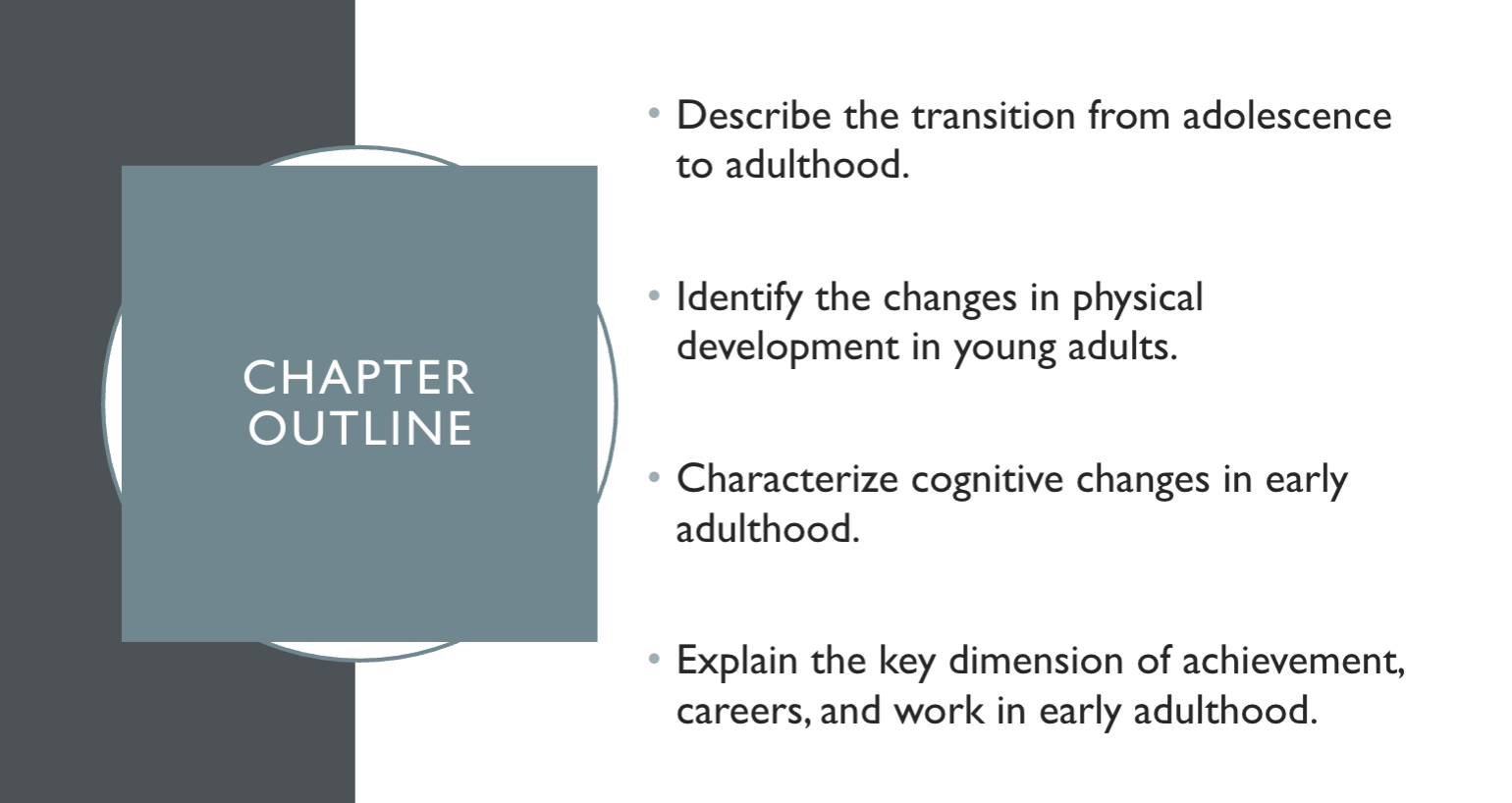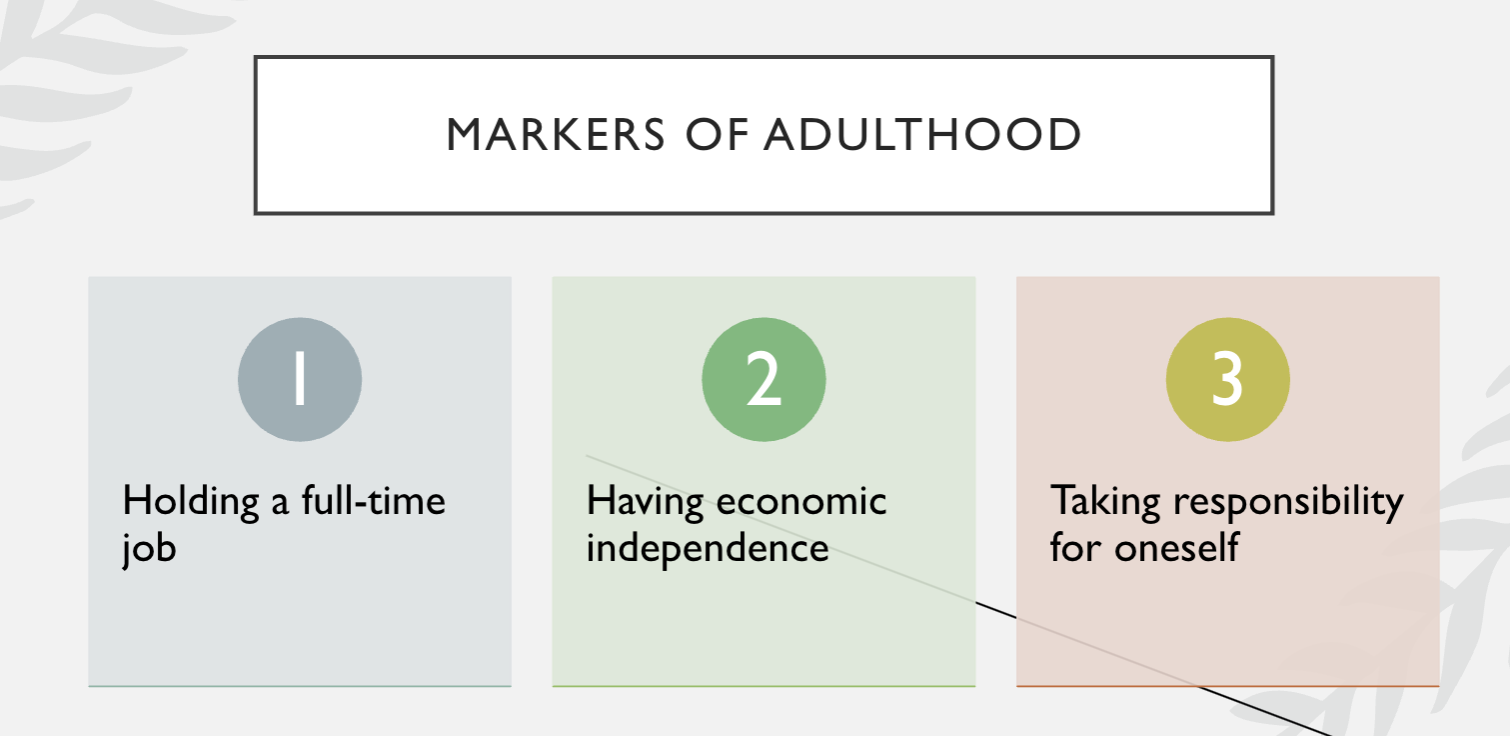Chapter 13

Emerging adulthood
The transition form adolescence to adulthood is known as emerging adulthood
Occurs from approximately 18 to 25 years of age
Characterized by experimentations and explorations
Key features:
Identity exploration, especially in love and work
The age of possibilities, individuals have an opportunity to transform their lives,
instability is common in love, work, education, and residence
Feeling in-between, young adults don’t consider themselves adolescents or full adults yet

Physical Changes
Physical performance and development
Peak physical performance typically occurs between 19 and 26 years of age
Muscle tone and strength usually begin to show signs of decline around age 30
Health
Emerging adults have twice the mortality rate of adolescents
Few chronic health problems
Increase in bad health habits
70% of college students do not get adequate sleep and 50% reports daytime sleepiness
Positive health behavior = positive life satisfaction
Substance Use/Abuse
Addiction is a pattern of behavior characterized by an overwhelming involvement with using a drug/substance and a preoccupation with securing its supply.
Alcohol:
Binge drinking increases in college
Alcoholism - disorder that involves long-term, repeated, incontrollable, compulsive, and excessive use of alcoholic beverages.
Impairs health and social relationships
Cigarettes & Nicotine:
Smoking is linked to…
30% of cancer deaths
21% of heart disease deaths
82% of chronic pulmonary disease deaths
Cigarettes consumption has decreased by vaping nicotine has dramatically increased
Sexuality
Approximately 60% of individuals have experiences sexual intercourse by the end of emerging adulthood
Casual sex is more common in emerging adulthood than in the late 20s
Heterosexual attitudes:
Males have more casual sex partners, while females report being more selective
Most Americans do not engage in kinky sexual acts
62% of college women reported having experiences sexual harassment while attending college
Cognitive Development
Piaget concluded that people enter the final cognitive stage, the formal operational stage, during adolescence
However, some theories argues that it is not until adulthood that many consolidate their formal operational thinking.
Is there a fith, post-formal stage of cognitive development?
The Brian
The frontal lobe of the brain, particularly the prefrontal cortex, usually fully matures around the age 25
The frontal lobe is repsonsible for many higher-level cognitive functions, such as:
Motor planning
Behavior
Personality
Impulsivity
Executive functioning
Planning
Solving problems
Making decisions
Cognitive control
Motivation
In thinking about a persons motivation in goal-achievement, psychologists examines 2 types of motivations
Extrinsic motivation - involves doing something to obtain something else or avoid an undesirable outcome
the activity is a means to an end
E.g., individual might work very hard at a job to get a promotion and earn more money, or to avoid getting fired
Intrinsic motivation - involves the internal motivation to do something for its own sake.
The activity is an end in itself
E.g., individual might work very hard at a job because they enjoy it
Careers and Work
From mid-20s on, individuals often seek to establish their emerging career in a particular field.
Only 20% of 12- to 22-year-olds have a clear vision of where they want to go in life
Most college students only focus on short-term goals
Focus on graduating rather than explore what they want to do long-term
Do you want to have a job, pursue a career, or follow a vocation?
Impact of Work
Work defines people in fundamental ways; it influences their financial standing, housing, the way they spend their time, where they live, their friendships, and their health.
Work can create a sense of structure to life, and daily routine, that is often missed when individuals do not work for an extended period or after retirement
Many individuals experience emotional distress and low self-esteem when they are unable to work
Most people spend about one-third of their time at work, with only 8% reporting to work less than 40hrs per week